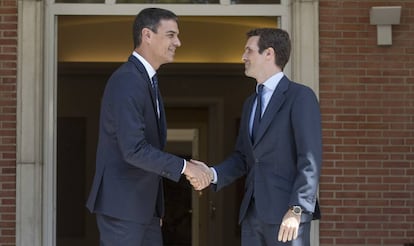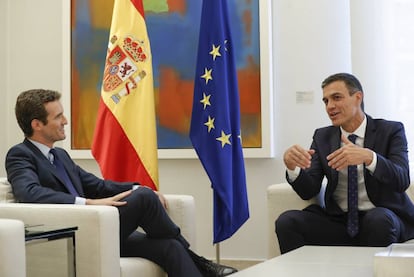In face-to-face meeting, Spain’s PM and PP leader fail to bridge gap over Catalonia
Pedro Sánchez and Pablo Casado sat down for nearly three hours to discuss matters of national concern

Spanish Prime Minister Pedro Sánchez and the main opposition leader, Pablo Casado of the Popular Party (PP), met for nearly three hours on Thursday at La Moncloa, the seat of government, to discuss issues ranging from immigration to gender violence and the situation in Catalonia.
But the meeting ended without any significant agreement, serving instead to highlight the division between the conservatives and the Socialist Party (PSOE) on the subject of Catalonia: while the latter thinks it is possible to respect the law and still hold talks with separatists, the PP rejects any form of dialogue with those who defend unilateral independence.
The PP called Sánchez “weak” and a “demagogue”
“I have asked Casado to head a responsible and loyal opposition on matters of national concern such as immigration, European policies, gender violence and infrastructure,” said Sánchez at a press conference following the meeting. The PM also insisted that there will be no concessions to Catalan separatists. “The common goal must be progress for Spain.”
But Casado, who became the new PP leader at a vote last month, less than two months after his party was ousted from government in a no-confidence vote led by Sánchez, was mistrustful.
“I want to think that what the separatists are saying is not true and that the PSOE is not going to yield to the pressure. If they did, the PP would use its absolute majority in the Senate to request the application of Article 155 of the Constitution and take it further, intervening in [Catalan public broadcaster] TV3,” said Casado, alluding to the 218-day takeover by Madrid of Catalan self-rule in the wake of the unilateral independence declaration of October. Direct rule was lifted on June 2, the same day that Pedro Sánchez was sworn in as the new prime minister of Spain following the no-confidence motion against former PM Mariano Rajoy.

Earlier this week, both leaders had had words of contempt for one another. The PP called Sánchez “weak” and a “demagogue” who is “on his knees” before the Catalan separatists. The Socialist government accused Casado of coming dangerously close to the xenophobic rhetoric of Italy’s Interior Minister Matteo Salvini, and declared him “unprepared” to govern Spain.
During their three-hour encounter, which was described as “cordial,” Sánchez and Casado talked at length about immigration. Since Sánchez took office on June 2, there has been an increase in migration flows to Spain and several high-profile cases have made world headlines, such as the Aquarius, a rescue ship that was turned away by Italy and taken in by Spain, and the mass border crossing into the Spanish enclave Ceuta. On Wednesday Casado traveled to Ceuta, a Spanish city on the northern coast of Africa, to express his concern about the “millions of Africans” who are waiting to cross into Europe.
The Socialist and Popular Party leaders agreed on broad guidelines to address gender violence despite a limited budget that is the legacy of the previous PP administration.
English version by Susana Urra.
Tu suscripción se está usando en otro dispositivo
¿Quieres añadir otro usuario a tu suscripción?
Si continúas leyendo en este dispositivo, no se podrá leer en el otro.
FlechaTu suscripción se está usando en otro dispositivo y solo puedes acceder a EL PAÍS desde un dispositivo a la vez.
Si quieres compartir tu cuenta, cambia tu suscripción a la modalidad Premium, así podrás añadir otro usuario. Cada uno accederá con su propia cuenta de email, lo que os permitirá personalizar vuestra experiencia en EL PAÍS.
¿Tienes una suscripción de empresa? Accede aquí para contratar más cuentas.
En el caso de no saber quién está usando tu cuenta, te recomendamos cambiar tu contraseña aquí.
Si decides continuar compartiendo tu cuenta, este mensaje se mostrará en tu dispositivo y en el de la otra persona que está usando tu cuenta de forma indefinida, afectando a tu experiencia de lectura. Puedes consultar aquí los términos y condiciones de la suscripción digital.








































